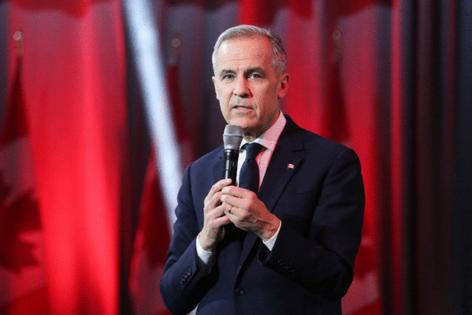Trump, Carney talk about new deal, plan meeting after Canada's election
Published in News & Features
WASHINGTON — President Donald Trump said he spoke with Canadian Prime Minister Mark Carney and that the two would meet after Canada’s election, amid an intensifying tariff war between the neighboring allies and major trading partners.
“It was an extremely productive call, we agree on many things, and will be meeting immediately after Canada’s upcoming Election to work on elements of Politics, Business, and all other factors, that will end up being great for both the United States of America and Canada,” Trump said in a post to his social-media platform on Friday.
Trump’s post called the Canadian leader “Prime Minister Carney” — a break from his practice of the past few months, when he repeatedly mocked Carney’s predecessor, Justin Trudeau, as “Governor Trudeau.”
Carney released a statement saying the two men agreed to start “comprehensive negotiations about a new economic and security relationship” after Canada’s April 28 national election. But the Canadian leader also reiterated that his government plans to put retaliatory tariffs in place after the U.S. administration unveils its new import taxes on April 2, which Trump has billed “Liberation Day.”
In the meantime, Commerce Secretary Howard Lutnick and Canadian Trade Minister Dominic LeBlanc will “intensify” their talks to “address immediate concerns,” the prime minister’s office said.
The Canadian dollar immediately jumped after Trump’s comments, rising as high as C$1.4277 per U.S. dollar.
Later, it gave back those gains when the president told reporters that he will “absolutely” follow through on tariffs against Canada. The loonie was trading at C$1.4319 per U.S. dollar as of 3:13 p.m. New York time — right around where it was trading before Trump’s social media post.
The call between the two leaders was their first since Carney assumed Canada’s top political office on March 14. It came days after Trump announced a 25% tariff on imported automobiles and auto parts, which Carney called a “direct attack” on Canadian auto workers and a violation of the U.S.-Mexico-Canada trade accord known as USMCA, which Trump negotiated during his first term in the White House.
Trump’s trade war against Canada and Mexico, along with repeated suggestions that Canada should become the 51st U.S. state, have cratered ties between the two North American neighbors. The Canadian election campaign has turned into a contest in which U.S. threats against Canada’s economy and sovereignty have become the dominant issue.
Carney told reporters that Trump respected Canada’s sovereignty during the call, which he characterized as “constructive” and “cordial.” But the president did not suggest that he would pull back on tariffs against Canadian products, Carney said.
“We have other trading options, which we’re going to continue to build, to be absolutely clear,” Carney said, speaking at a Montreal port where he promised to create a new “trade diversification” fund to build infrastructure to reach new export markets.
He said Canada’s preference is for Mexico to be included in trade negotiations with the U.S. “In our opinion, there has to be a new agreement,” Carney said. “There are too many changes, too many tariffs, too many threats coming at us,” which have created economic uncertainty.
Carney’s Liberal Party has a slight edge over the Conservative Party in a number of recent polls, but it’s still a tight race.
The prime minister said Thursday the U.S. is “no longer a reliable partner” and that the U.S.-Canada relationship will be different in the future because of Trump’s actions.
“The old relationship we had with the United States, based on deepening integration of our economies and tight security and military cooperation, is over,” he said.
Carney’s main political opponent, Conservative Leader Pierre Poilievre, is running on what he calls a “Canada First” agenda and said Canada needs to “stand strong on our own two feet against the American threat.” The Liberals under Trudeau have made Canada more vulnerable to U.S. aggression by weakening the economy, Poilievre has said.
Trump’s auto tariffs, announced Wednesday and slated to take effect next week, would be a major blow to Canadian manufacturing. Canada shipped nearly C$50 billion ($35 billion) of vehicles into the U.S. market last year, making autos one of its most important exports.
Trump has already announced broad 25% tariffs on imported goods from Canada — with a lower 10% levy on energy — though he gave a short-term exemption for items shipped under USMCA. And Trump has threatened further sectoral tariffs covering products for which Canada is a top exporter, including lumber. He also plans unspecified global reciprocal tariffs, which are set to be unveiled April 2.
Canada has already implemented retaliatory import taxes of 25% on about C$60 billion ($41.9 billion) worth of U.S. goods so far, and has threatened tariffs on another C$95 billion, if necessary. Canadians are also increasingly boycotting US goods, prompting warnings from several U.S. companies on rising anti-American consumer sentiment.
Vice President JD Vance, speaking from Greenland on Friday, warned against trade retaliation from Canada.
“We love the Canadian people, but the Canadian leadership threatening retaliatory tariffs against the United States — as President Trump often says, they just don’t have the cards,” Vance said. “There is no way that Canada can win a trade war with the United States.”
(Derek Decloet, Laura Dhillon Kane and Brian Platt contributed to this report.)
©2025 Bloomberg L.P. Visit bloomberg.com. Distributed by Tribune Content Agency, LLC.







Comments